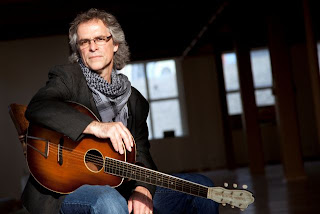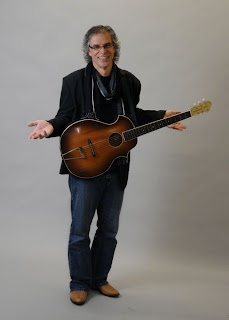Marcel Desilets is a Winnipeg-based singer-songwriter whose music goes best with a hot coffee on a sunny, Saturday morning patio. About to release not one, but two albums simultaneously, provided a great opportunity to dig a little deeper into Marcel's music.
DS: How long have you been playing and writing?
MD: I started playing sometime when I was around 15 years old, writing just happened naturally at the same time.
(Ed: I estimate that's about 25-ish years or more)

DS: That's young. Most 15 year-olds are learning covers. Which artists are your greatest influences?
MD: Well, it almost sounds cliché, but I guess but my main influences, especially early on, were Neil Young, Bruce Cockburn and Bob Dylan. Neil Young’s “After the Gold Rush” was the first record that made me really stop and listen.
DS: What in general, inspires your songwriting?
MD: “This is a true story” is an intro to one of my more humourous songs. But all my songs are essentially that: they’re all true stories. I mostly write from personal experiences, from what is around me, close to me, and everyday simple occurrences.
DS: Do you approach songwriting as a discipline, as in 'I must write every day' or as the muse appeals?
MD: I’m pretty undisciplined when it comes to writing, although I always have a pen and paper of some sort with me to write down phrases that come to mind, even sometimes just a word or too. Then, when the moment of inspiration strikes where a series of lines may present themselves, I have notes to search through to look for connections that may help in the building of the written portion of the song.
I’m always noodling around on the guitar, much more than noodling with the written word, so a lot of my songs come from a picking pattern that I’m just fooling around with, or a chord progression that just all of a sudden sits differently with me, and coupling that with some lyric or even just a melody that runs through my head is where a lot of my songs are born.
Dreams too. I have several songs that were direct results of lines that were written down upon waking up from a dream state with that “I better write this down right now” feeling.
DS: Ah – a collector of words and phrases. I can identify with that. What do you most want to say in your songs? How do you want people to feel after listening to your music?
MD: I don’t think I write with the intent of putting a message in my songs. I just write whatever comes to me at the time. The song has to sit well with me, and mean something to me.
I’ve heard time and time again that my music leaves people feeling good. That’s a huge and humbling compliment. I have written some songs that have a sense of longing and loss (although the metaphors can certainly be interpreted differently) but I don’t typically write sad songs. As much as I like hearing them, I leave the writing of sad songs to those who do it well. A good friend once called me “militantly happy.: I live a life that I’m very thankful for, so my songs come from that.
DS: You are a DIY music maker. Describe Dragonfly Studios (your home studio set up). What is your essential gear, and how did you learn to use it?
MD: I'm not a gear head. Recording myself was really something that I never wanted to delve into, but reality and finances dictated direction. I was incredibly fortunate to have had a capable computer given to me which became the foundation of my home studio, and turn what I thought would be a huge learning curve and detriment to creativity into exactly the opposite, I’ve now recorded three full length albums in my studio.
My set up is very simple, which works for me…a couple decent mics, interface, and the desire and drive to make it sound the best that I can. My music has a simple structure to it, so the simple recording set up works well.
DS: You are a multi-instrumentalist. What instruments to you play? What was the first instrument you learned to play?
MD: My first instrument was the acoustic guitar, one that my dad bought from a friend of his for ten bucks. I remember we painted it red and black. I eventually picked up the electric guitar and went back and forth a lot between the two. Over the years I’ve learned to dabble with a few other stringed instruments including mandolin, banjo, Dobro and other acoustic lap slides, and electric lap steel guitar. I also play a little harmonica, an instrument that my dad was exceptionally good at.
DS: From what I know about you, I'd say you're very humble to use the word “dabble.” You're increasingly being called upon as a sideman. How did those opportunities come your way?
MD: I started the sideman thing with my friend
Brenda Neiles. Mostly I was playing banjo with her on her songs, and one day when we were practicing I asked her, “Have you ever seen that old guitar of my Dad’s?” I was referring to the Dobro that belonged to my dad which I had inherited when he passed away. I hadn’t ever played it much but took it out of the case and from that day on really started to play it. That’s the instrument that I’m now called to play mostly when asked by other performers for accompaniment.
DS: Congratulations on the two new albums you're about to release. One has lyrical material, one has instrumental material. Can fans expect more of the same as your past work, or is this something quite different?
MD: The songwriter album, titled There’s a Story To Tell, features eleven tunes, one of which is an instrumental, with the instrumentation arrangements that I am familiar with, and love to work with. The structure of my songs lends itself to traditional style instrumentation.
I’m once again privileged to have good friends from the Winnipeg music scene accompanying me on this record both instrumentally and vocally, including: Anthony Kost (upright bass), Jed Desilets (drums) and Johnny Calderon (electric bass) from the
Bokononists, Kami Desilets (harmonies),
Vanessa Kuzina (harmonies),
Allison de Groot (banjo) and
Rosalyn Dennett (fiddle) from Oh My Darling, Jonathon Alexiuk (trumpets and saxophones), and
Lindsay Jane (harmonies). I’ve also added lap slide guitar here and there. There are some tunes though, that fall out of the “folk” category somewhat, bringing a bit of a different direction to parts of this album.
Two Minute Warning is a project that developed around all the little ideas I come up with while sitting with the guitar or banjo, ideas that don’t necessarily find their place in songs, that I started thinking would be fun to catalogue. It evolved into the idea of creating a full album of tunes, none of which are greater than two minutes. It was a fun challenge, that allowed me to play all the parts with the instruments I love to play, including of course guitars, as well as banjos, lap slide instruments including Dobro, acoustic lap slides, slide banjo and electric lap steel, also electric fretless bass, mandolin and even ukulele. There is the occasional shaker and even an old suitcase I used for some percussion here and there.
DS: You've already sent me some sneak previews from Two Minute Warning. While I lean more toward lyrical music, these samples drew me in immediately, and made me smile. What are your hopes for the instrumental album?
MD: The main objective in my music is always to create for myself first, and to be totally satisfied creatively with what I set out to accomplish. Part of the creativity with Two Minute Warning was the challenge of creating a flow, or continuity, being that these pieces were all short pieces that vary in length and in style. I wanted this first and foremost to be an album of music that could be listened to and enjoyed in its entirety.

Having said that, I do believe that a lot of what’s on this album are the type of pieces that could be used in theatre, or as segment breaks you might hear on talk radio. So if anything, I feel that this is probably my most marketable work to date, and I couldn’t help but think along those lines as I was putting this album together.
DS: I'm a big believer in testing new material with others – kind of like a quest for the best I can do. You belong to the
Manitoba Songwriters' Circle where you receive critique and feedback on your new material from fellow singer-songwriters. How has this experience helped you improve your craft? What advice might you have for budding singer/songwriters about to go to their first song circle?
MD: Aside from meeting so many great songwriters and developing good friendships, the circle has been a good experience all around for me. Having the opportunity to hear feedback that comes from so many different types of backgrounds, and from all kinds of perspectives such as melody, rhythm, structure, and the craft of song writing, has given me much to ponder when the inspiration for a song hits me.
For first time attendees, I’d suggest going with a thick skin, and the understanding that all suggestions/critiques are given with the intent that you can take it or leave it, in terms of what you feel is right for your song.
DS: When and where is your double CD release concert? How can people get tickets?
MD: The CD Release Concert will be held on November 6, 2010 at the
Park Theatre, 698 Osborne Street, 204-478-7275, Winnipeg MB. Tickets can be purchased through me for $10, or for $12 at the Park. The line up of musicians backing me for my set is still in progress, but I hope to have most of those who played on the album joining me on stage.. but it’s looking good. Opening the evening with a set will be the fabulous Lindsay Jane!
DS: Thanks for taking the time to do this, Marcel. All the best on your new projects. I'm looking forward to hearing your new CDs.


